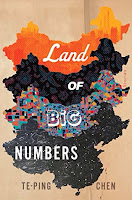"...a fine meal [should be] designed to feed the mind, not just the mouth and the stomach."
It's no secret that I love food memoirs – in fact, if given a choice between reading a regular memoir and a food-related memoir, the food one wins out every time! The reason for this is, well yes, I love to eat, but more significantly, I'm also fascinated by the "culture" of food and the myriad ways that different experiences with food can shape our lives, often in the most unexpected ways. In this regard, Carolyn Phillips' newest work At the Chinese Table was the absolute perfect read, one that checked every single box in terms of what I look for in memoirs, yet at the same time, it also exceeded my expectations in so many ways. It's not often that a memoir goes way beyond its stated intent of providing insight into aspects of the author's life by incorporating elements such as: a beautifully written, immersive narrative that brought various delectable food dishes to life through lush, vivid descriptions; wonderfully-rendered illustrations (all drawn by the author herself!) woven throughout each chapter that perfectly complemented the author's story; an in-depth exploration of not just a diverse and rich cuisine, but also its history and culture; easy-to-follow recipes with helpful tips and even a glossary of often-encountered terms; and ancestral stories about the Chinese family she married into, a family that inadvertently taught her so much about life, love, relationships, and food.
My experience reading this book was actually very different from all of the previous food memoirs I've read in the past due to the fact that I grew up in a traditional Chinese family just like the author's husband – a background that meant, going into this book, I already had a certain familiarity with the cuisines and the various dishes described in such vivid detail throughout the book. With Chinese food oftentimes depicted in a homogenous, stereotypical way in mainstream American culture, it was refreshing to see Phillips (a white American woman) go the opposite direction and actually take the time to explore, recognize, and embrace the variety of flavors and nuances of Chinese cuisine (of course, the fact that her Chinese husband is an epicurean who shares her love for good, authentic Chinese food definitely helped) — to the point that her enthusiasm and love for Chinese cuisine shines forth in every page. I love how Phillips covers such a variety of different cuisines from all across Taiwan and Mainland China — from food stalls, street markets, and hole-in-the-wall local diners to traditional family dishes and even "haute couture" fare from fancy restaurants. I mean, how often will you see dishes such as the following mentioned all in one book: yanduxian (one of my favorite Shanghainese dishes), dandan mein, suanni bairou (a Sichuanese dish that is spicy as hell but oh so delicious!), pidan doufu (a tofu dish with preserved egg), xianfantuan(rice roll with fried cruller and other stuffing that, when paired with a warm bowl of soy bean milk, is one of the most heavenly of Taiwanese breakfasts!), hongxiao shizitou (red-braised lion's head meatballs), fenzheng paigu(rice-covered steamed pork ribs over sweet potato — another of my favorite dishes that I rarely see mentioned anywhere!), just to name a few. It was such a delight to see so many familiar dishes (and more) given such detailed coverage (the one downside though was that I started craving these dishes as I was reading knowing full well I wouldn't be able to satisfy those cravings any time soon).
Without a doubt, this has been one of the most personal and heartfelt memoirs I've read to date! It's definitely a must-read for anyone who loves and appreciates the varied flavors of authentic Chinese cuisine. Highly recommended!
Received finished copy from publisher W.W. Norton Company via BookBrowse First Impressions program.





